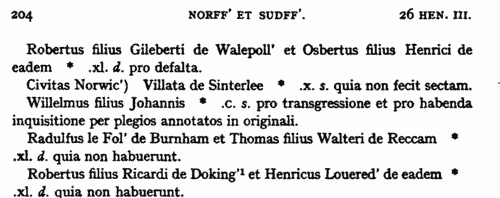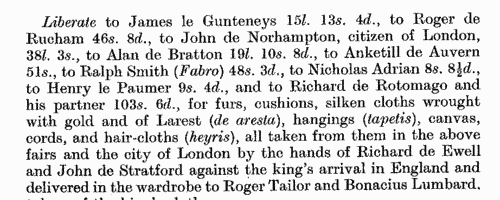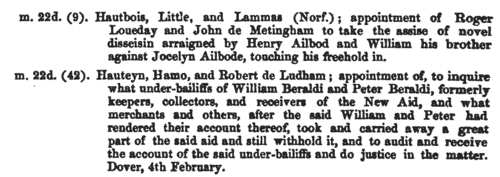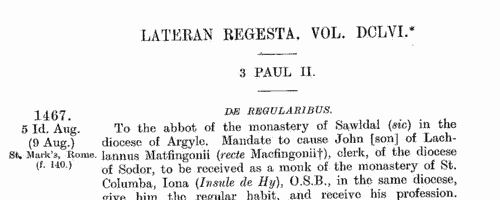Pele Surname Ancestry ResultsOur indexes 1000-1999 include entries for the spelling 'pele'. In the period you have requested, we have the following 15 records (displaying 1 to 10): Buy all | | | Get all 15 records to view, to save and print for £74.00 |
These sample scans are from the original record. You will get scans of the full pages or articles where the surname you searched for has been found. Your web browser may prevent the sample windows from opening; in this case please change your browser settings to allow pop-up windows from this site. Curia Regis Rolls
(1210-1212)
The Curia Regis, king's court, of mediaeval England took cases from throughout the country, and its records are among the most important surviving from this early period.PELE. Cost: £4.00.  | Sample scan, click to enlarge

| Pipe Roll
(1241-1242)
The Great Rolls of the Pipe are the central record of the crown compiling returns of income and expenditure from the sheriffs and farmers of the various English counties or shires. This is the oldest series of public records, and the earliest surviving instances of many surnames are found in the Pipe Rolls. This is the roll for the 26th year of the reign of king Henry III, that is, accounting for the year from Michaelmas 1241 to Michaelmas 1242. Most (but not all) of the entries in which names appear relate to payments for grants of land and fines or pardons arising from the proceedings of the justices. The text was edited by Henry Lewin Cannon for Yale Historical Publications and printed in 1918. The name of the county is given at the head of each page, and variant spellings, omissions and additions found in the duplicate Chancellor's Roll [C. R.] are given in the footnotes.PELE. Cost: £4.00.  | Sample scan, click to enlarge

| Liberate Rolls
(1251-1260)
These chancery liberate rolls of the 36th to 44th years of the reign of Henry III of England record the details of payments and allowances as part of the administration of government. Most entries start with the Latin words 'liberate', meaning 'deliver', or 'allocate', meaning allow. There are also 'contrabreves', warrants mainly to sheriffs of shires, assigning them tasks and allowing expenses. Most of the entries relate to England and Wales, but there are occasional references to Ireland and the English possessions in France.PELE. Cost: £4.00.  | Sample scan, click to enlarge

| Patent Rolls: entries for Kent
(1277-1278)
Calendars of the patent rolls of the reign of king Edward I are printed in the Calendars of State Papers: but these cover only a fraction of the material on the rolls. From 1881 to 1889 the reports of the Deputy Keeper of the Public Record Office also include calendars of other material from the rolls - about five times as many entries as in the State Papers - predominantly mandates to the royal justices to hold sessions of oyer and terminer to resolve cases arising locally; but also other general business. The calendar for the 6th year of king Edward I [20 November 1277 to 19 November 1278], hitherto unindexed, is covered here.PELE. Cost: £6.00.  | Sample scan, click to enlarge

| Inhabitants of Yorkshire: Morley wapentake
(1379)
The poll tax returns for this wapentake, the area around Bradford and Halifax.PELE. Cost: £6.00.  | Sample scan, click to enlarge

| Inhabitants of Cheshire and North Wales
(1400-1409)
The county of Cheshire had palatine status, being in some measure independent of the rest of England: moreover, from the Statute of Wales of 1284, after king Edward I's subjugation of North Wales, until the union of England and Wales in 1536 to 1543, much of the administration of North Wales (county Flint in particular) was directed from Chester. When the Chester Recognizance Rolls were moved from Chester to the Public Record Office, they were placed among the Welsh Records. These rolls, so called because they do include recognizances (of debts &c.) among their contents, are in fact the Chancery Rolls of the palatinate, containing enrolments of charters, letters patent, commissions and other documents issued under the seal of the palatinate. Deeds and other evidences of a private nature were also enrolled on them. A calendar of the Recognizance Rolls from their commencement to the end of the reign of Henry IV was prepared by Peter Turner and included in the 36th Annual Report of the Deputy Keeper of the Public Records in 1875. We have now indexed this, dividing the enrolments into decades. This is the period from the 1st to the 11th years of king Henry IV.PELE. Cost: £6.00.  | Sample scan, click to enlarge

| Clergy, the religious and the faithful in Britain and Ireland
(1458-1471)
These are abstracts of the entries relating to Great Britain and Ireland from the Lateran and Vatican Regesta of popes Pius II and Paul II. Many of these entries relate to clerical appointments and disputes, but there are also indults to devout laymen and women for portable altars, remission of sins, &c. This source is particularly valuable for Ireland, for which many of the key government records of this period are lost. Many of the names in the text were clearly a puzzle to the scribes in Rome, and spelling of British and Irish placenames and surnames is chaotic.PELE. Cost: £4.00.  | Sample scan, click to enlarge

| Freemen of London
(1540-1550)
The long series of mediaeval registers and books of admission of the freemen of London was destroyed by fire in 1786. Thirty surviving charred leaves were gathered together and rebound, becoming Egerton MS 2408 in the British Museum. The order is jumbled and generally speaking none can be dated with certainty, although all belong to the very end of the reign of Henry VIII and the start of the reign of his son, Edward VI. These are pages from the admission books. Each entry here usually gives the name of the person admitted to the freedom; his father's name, address and occupation; his entitlement to the freedom, usually by having served out an apprenticeship to a citizen, naming the master and his trade. Then there may follow a cross-reference to M. or N., being two volumes of another set of official books denoted by the letters of the alphabet, and following each other in chronological sequence, which evidently gave details of entries into apprenticeships. These other books no longer exist: but the dates given for entry do identify the start of the apprenticeship, and so give by implication a date for the eventual admission to freedom. In the margin is the name of the city ward and the total of the fee and fine paid on admission.PELE. Cost: £4.00.  | Sample scan, click to enlarge

|  Masters and Apprentices
(1740) Masters and Apprentices
(1740)
Apprenticeship indentures and clerks' articles were subject to a 6d or 12d per pound stamp duty: the registers of the payments usually give the master's trade, address, and occupation, and the apprentice's father's name and address, as well as details of the date and length of the apprenticeship. 6 October to 3 December 1740PELE. Cost: £8.00.  | Sample scan, click to enlarge

| Nottinghamshire Marriage Licences
(1701-1753)
Nottingham Archdeaconry, which was almost coextensive with the county of Nottingham, lay in the diocese and province of York, but it had substantially independent jurisdiction for both probate and the issuing of marriage licences. These are abstracts of the archdeaconry marriage licences: they usually state the groom's address, occupation, age, and condition; the bride's address, age and condition; and the names of the churches or parishes at which it was intended the marriage would be celebrated. Not all licences led to marriages. Where the age given is 21, it should be construed as '21 or over'. There was no obligation for the marriage to take place at the parish suggested, but the licence would only be valid within the county. These abstracts have been annotated with extra information found on the marriage bonds. 26 Nottinghamshire parishes (Beckingham, Darlton, Dunham, Eaton, North Leverton, Ragnall, Rampton, South Wheatley, Cropwell Bishop, Bleasby, Blidworth, Calverton, Caunton, Edingley, Farnsfield, Halloughton, Holme, Kirklington, Morton, North Muskham, Norwell, Oxton, South Muskham, Southwell, Upton and Woodborough) lay within the small peculiar jurisdiction of Southwell, which issued its own licences: abstracts of these for the period 1755 to 1833 are also included here.PELE. Cost: £4.00.  | Sample scan, click to enlarge

|
| 1 | 2 |  |
Research your ancestry, family history, genealogy and one-name study by direct access to original records and archives indexed by surname.
|













